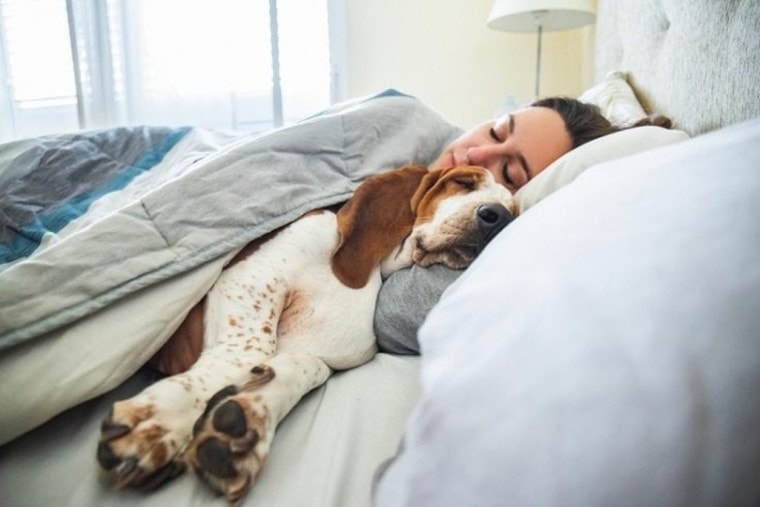
Sleeping with your best friend (your dog) may have surprising benefits. Nevertheless, this question divides canine owners.
Some people tolerate this practice, even encourage it, while for others, allowing access to their bed or even their bedroom is totally unacceptable. The arguments held in each of the two camps are quite solid. But what does science say exactly?
Here is the list of eight scientifically-proven benefits of sleeping with your four-legged housemate, which will help you decide whether or not to let your canine companion share your bed tonight!
The 8 Benefits of Sleeping With Your Dog
1. Better Sleep for People With Anxiety
One study noted that people with post-traumatic stress disorder and anxiety, whose nights can be very restless, sleep much better with a service dog, and they have fewer nightmares
Maybe this is the effect of oxytocin? The “love” hormone helps form bonds of attachment between two individuals and appears to have an anti-anxiety and anti-stress effect. Your body produces more of it when you are in contact with your dog.
Other biological causes could explain this phenomenon. For example, stroking a dog seems to cause a drop in blood pressure and, therefore, have some positive cardiovascular effects.1

2. Greater Sense of Security and Comfort
For most of us, sleeping with a dog makes us feel safe and comfortable. One study even compared the sleep of women sleeping with a cat, dog, or human.2 The authors concluded that dogs were perceived to cause less sleep disruption and to provide a greater sense of security and comfort than human partners.
This finding is not that surprising, given that some cats tend to wake their owners up in the wee hours of the morning and don’t let go until you go to fill the bowl that still has food in it. And also, humans who snore, grind their teeth, or curl up in a duvet to leave you only 6 inches of blanket.
But more seriously, what stood out most in this study was the sense of security, which is more important when a woman sleeps next to a dog than when she sleeps with a man. But don’t take it the wrong way, gentlemen. The dog has an advantage over you; its “alarm” effect is more effective than yours, which is even more reassuring!
3. Positive Effects on Mental Health
Many dog sitters consider that the mere presence of a canine companion has a positive impact on mental health. Indeed, these would provide good emotional support. In addition to reducing stress, people with anxiety and depression seem to benefit from their contact. So, if cuddling your dog makes you happy, then why deprive yourself of their presence at night?

4. Less Anxiety In Your Dog
Dogs can also feel the same well-being when their human is around them, thanks, in part, to oxytocin secretion.
Indeed, dogs love to be with and spend time with their humans. For anxious dogs, sleeping near us is a time when they feel safe, and their stress is reduced considerably. So, for a nervous dog, snuggling up in bed with their human is probably one of the few times they can really sleep well and relax.
5. Decreased Loneliness
Lonely people can benefit greatly from the habit of sleeping with their dog, according to this study. Indeed, dogs provide us with a sense of emotional well-being, thanks to their unconditional love for us; that is why their company is rewarding and comfortable for people who live alone.
Sleeping with your dog would also help people overcome personal trauma, such as grief.

6. Natural Source of Heat
One of the reasons to sleep with your dog that doesn’t need to be scientifically proven is simply for the extra heat they provide! Indeed, your furry companion is a perfect heater for cold winter nights; on the other hand, in summer, you risk having the opposite problem!
7. Strengthening the Bond With Your Dog
Sleeping with your companion helps with socialization and makes training easier. In addition, admit that it is very difficult to resist the crying or the beaten dog stares that your four-legged companion throws at you on the landing of the door of your room! This is because the dog is a social animal, like us. They, therefore, have a constant need for interaction and contact with their humans. Never far from you, your dog will also feel safer sleeping by your side, and this will make your bond even stronger.

8. Living With Pets Reduces Allergies Later in Life
A Canadian study found a surprising link between infants and furry pets. According to the report’s findings, living with a dog (or cat) during the first 3 months of life reduces the risk of developing allergies. To come to this conclusion, the researchers studied 2,500 babies over a 10-year period.
A 2019 study involving just over 1,300 3-month-old babies showed that living with dogs was linked to a reduction of 90% in the chances of developing food allergy later in life. However, this does not mean that you should let your baby sleep with your dog. Always follow your pediatricians’s advice on this matter.
Are There Downsides to Sleeping With Your Dog? Top 4 Myths Explained
Now that you know a little more about the benefits of sleeping with your canine companion let’s take a look at the persistent myths attributed to this habit as well.
1. Your Dog Will Think They’re The Pack Leader
The term “dominant” is a catch-all word for a bunch of unwanted behavior, the cause of which many people don’t understand. Your dog is not plotting to try to steal the chef’s place from you. You decide when they eat, play, walk, sleep, etc. So, how could they conclude that they are the boss?
The dog is an opportunistic and hedonistic animal. If they’re allowed to sleep somewhere warm and comfortable, they’ll benefit from it. This is not an assertion of dominance — it is simply an opportunistic choice.
Nevertheless, a dog who is very possessive of their owner will indeed tend to be aggressive toward any other human or animal who wants to share their bed with you. But that comes down to their socialization and education. Therefore, it is your responsibility to educate your dog to accept the presence of another person in your bed. If you notice an aggressive reaction, you should not allow them to spend the night with you until this behavior changes.

2. Your Dog Will Become Too Spoiled
Like anything with dogs, if you are clear about what you want and what you don’t want, your dog will be able to discriminate. So, just because your dog is sleeping in your bed does not mean that they will start to behave unwantedly. There is no connection between these two elements; it is rather our tendency to attribute anthropomorphic behaviors to our pets that would be responsible for this persistent myth.
3. Your Dog Will Suffer From Separation Anxiety
While teaching your dog to learn to be temporarily separated from you is crucial, there is no real evidence that sleeping with you will cause separation anxiety. On the other hand, it is true that in a dog already extremely dependent on their owner, co-sleeping can aggravate the problem. However, in a well-balanced dog, sleeping with their owner does not cause additional anxiety; it is quite the opposite!
4. Your Dog Will Never Want to Sleep Anywhere Else
Again, it depends on the training you gave to your furry friend. So, by making a habit of putting your dog to sleep elsewhere on occasion and making other places comfortable and positive, you shouldn’t have a problem. Of course, you have to make sure that the dog is comfortable in their crate and well trained.

The Caveat
However, all the positive aspects of human sleep can be reversed if your dog is restless at night. An American study showed that subjects who slept with their dog in their bed had a good quality of sleep. Nevertheless, the sleep efficiency (time spent asleep from the total time in bed) is higher if the dog only sleeps in the same room and not on the same bed.
Besides, if you suffer from pet allergies, you should avoid sleeping in the same room with your dog. In addition, studies have shown that dogs that share the bed with their owners can transmit infectious diseases, such as fleas and certain bacteria. You need to make sure you protect your dog against internal and external parasites. You should keep excellent hygiene and be especially careful if your dog is fed a raw diet or if there is anyone with a weakened immune system in the household.
Final Thoughts
If you don’t have severe allergies or sleeping difficulties, sleeping with a dog, or at least in the same room, may be beneficial. That said, co-sleeping with your furry companion is a personal decision. In some cases, this habit may not work. For example, if it creates tension in your couple, or if your dog moves a lot and snores all night! But in the end, getting a good night’s sleep is essential for mental and physical balance, so it’s up to you to see what can improve yours and what not. If sleeping near your dog makes it better, then why not?
Featured Image Credit: Daniel Myjones, Shutterstock








